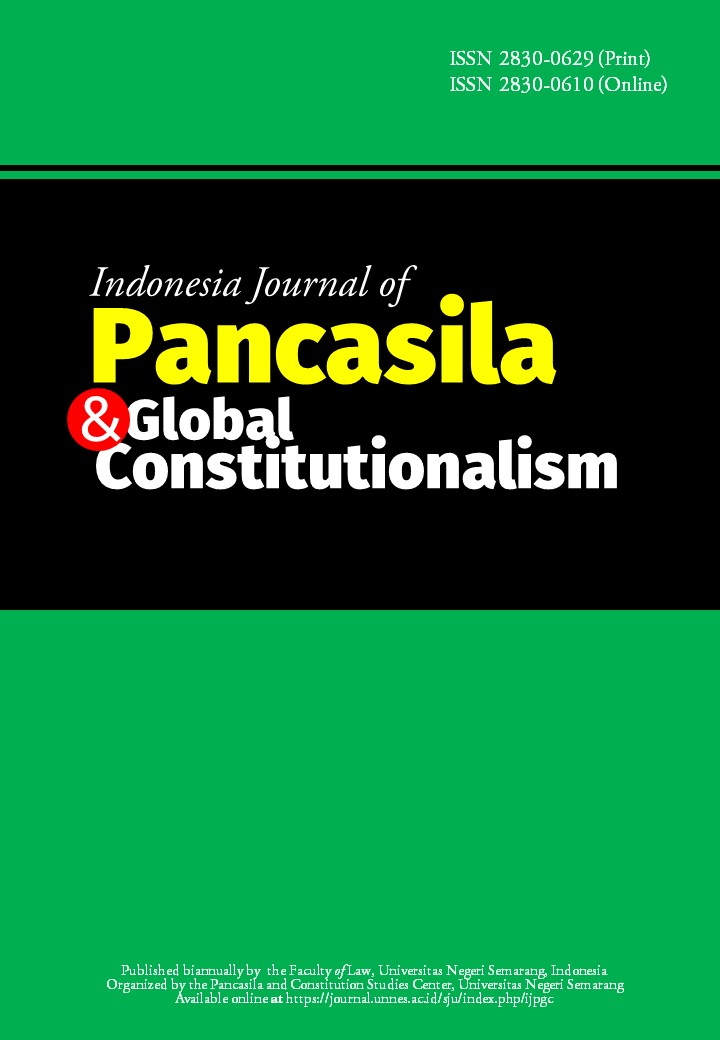Pancasila as a Paradigm of Socio-Cultural Development
Main Article Content
Abstract
Currently, there are many cultures that deviate from the prevailing norms. Lots of people forget the values of Pancasila that already exist. The existence of western culture makes our nation forget the culture that we have ourselves. Some of them are even more proud when using the culture of other nations. As a result, the culture that we have is eroded and gradually lost by the times. It's not a bad thing if we know other cultures, but we must not forget the culture of our own country. But today, they actually forget the identity of their own country, the prevailing paradigm is gradually disappearing. Paradigm is a person's perspective that can influence a person's way of thinking (cognitive), behaving (affective) and behaving (conative). Paradigm itself is very influential on a person's behavior in implementing Pancasila values. If the values in Pancasila are practiced properly, of course we will not lose our own national identity. The existence of Pancasila is also a guideline for upholding noble human values. Pancasila itself is essentially humanistic because Pancasila is based on the position of human nature or what is commonly called human rights. As stated in the five precepts, Pancasila always puts human rights first. This is in accordance with what is stated in the second precept, namely Just and Civilized Humanity. Thus, socio-cultural development must uphold human values and human dignity in order to produce cultured and civilized human beings.
Article Details

This work is licensed under a Creative Commons Attribution-ShareAlike 4.0 International License.
References
[2] Kaelan. 2003. Pendidikan Pancasila. Yogyakarta: Paradigma.
[3] Suranto Aw. 2013. Pancasila sebagai Paradigma Pembangunan Karakter Bangsa. Jurnal dialog kebijakan publik. Direktorat Pengelolaan Media Publik.
[4] Calam, Ahmad dan Sobirin. 2008. Pancasila sebagai Paradigma Kehidupan dalam bermasyarakat, Berbangsa, dan Bernegara. Jurnal Saintikom. Vol. 4/No.1 Januari 2008.
[5] Hanapiah, Pipin. 2001. Pancasila sebagai Paradigma. Bandung. 2001. [Online] http://repository.unpad.ac.id/1725/ [diakses 5 Oktober 2016].
[6] Koento. Pancasila sebagai Paradigma Pengembangan Ilmu Pengetahuan. 2000. Jakarta: Ditjen Dikti Depdiknas.
[7] Bahar, Saafroedin. 2017. Pancasila sebagai Paradigma Pembangunan Nasional Bidang Sosial Politik. Jurnal Ketahanan Nasional. Universitas Gajah Mada.
[8] Wirutomo, Paulus. 2013. Mencari Makna Pembangunan Sosial: Studi Kasus Sektor Informal di Kota Solo. Jurnal Sosiologi. Vol. 18 Januari 2013:101-120.
[9] “Bidang Pembangunan Sosial Budaya dan Kehidupan Beragama,” 2011. [Online] Available: http://www.bappenas.go.id/files/ [diakses 24 Mei 2011]
[10] Lumintang, J. 2015. Pengaruh Perubahanan Sosial terhadap Kemajuan Pembangunan Masyarakat di Desa Tara-Tara I. e-journal “Acta Darma”. Volume IV No. 2. Tahun 2015.
[11] L. J.Moleong. 2006. “Metodologi Penelitian Kualitatif,” Kualitalif Sasial, pp. 31–44.
[12] Depdiknas. 2008. Pengolahan dan Analisis Data Penelitian.
[13] Soegito, A.T. dkk. 2012. Pendidikan Pancasila. Semarang: Pusat Pengembangan MKU/MKDK–LP3 Universitas Negeri Semarang
[14] Academia.edu. Implementasi Pancasila dalam Sosial Budaya. [Online]
Available: https://www.academia.edu/7177398/Implementasi_Pancasila_dalam_Sosial_Budaya
[diakses 16 November 2014]
[15] S. I. dan Sidharta. 2013. Metode Penelitian Hukum, Konstelasi dan Refleksi. Jakarta: Yayasan Obor Indonesia.
[16] Kuncono, Setio Ongko. 2013. Pentingnya Membumikan Nilai-nilai Pancasila Dalam Kehidupan Berbangsa dan Bernegara. Jurnal hukum. Universitas Tujuhbelas Agustus.
[17] M Toyibin. 1997. Pendidikan Pancasila. Jakarta: Rineka Cipta.
[18] Arwani, Muhammad. Memahami serta Mengamalkan Pancasila dalam Kehidupan Berbangsa dan Bernegara. Jurnal Ilmiah. Universitas Negeri Semarang.
[19] Soeprapto, Sri. Aktualisasi Nilai-nilai Filsafat Pancasila Notonagoro. Jurnal Filsafat Agustus ’95. Universitas Gajah Mada, Yogyakarta.
[20] Nugroho, Iwan. 2010. Nilai-nilai Pancasila sebagai Falsafah Pandangan Hidup Bangsa untuk peningkatan Kualitas Sumber Daya Manusia dan Pembangunan Lingkungan Hidup. Jurnal Konstitusi. Vol III, No. 2, November 2010. Puskasi FH Universitas Widyagama Malang.
[21] Zabda, Syahrir Sutan. 2016. Aktualisasi Nilai-nilai Pancasila sebagai Dasar Falsafah Negara. Jurnal Pendidikan Ilmu Sosial. Vol 26, No 2, Desember 2006. ISSN:1412-2835.FKIP UMS.
[22] Rukiyati, dkk. 2008. Pendidikan Pancasila Buku Pegangan Kuliah. Yogyakata: UNY Pres.
